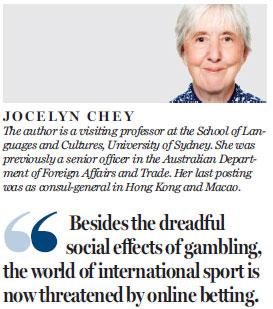More needs to be done to fight the social evils of gambling
Updated: 2016-01-27 08:32
By Jocelyn Chey(HK Edition)
|
|||||||||
An explosive joint investigation by the BBC and Buzzfeed into sports betting coincided last week with the world's top tennis players gathering in Melbourne for the Australian Open. According to the report, 16 top players had lost games when suspicious bets were placed against them and one player participating in the Australian Open was suspected of having fixed his first sets. Although the media probe covered events going back 10 years and there has been action since to strengthen reporting systems, match fixing is more and more common. It has a lot to do with the relatively new phenomenon of Internet betting. In this Olympic year, it is important for the international community to come together to tackle this growing threat to the integrity of sport. No country is immune and a coordinated response is called for.
Hong Kong may be a small player on the international sports scene, but even here there have been scandals. Irfan Ahmed is a Pakistan-born Hong Kong cricketer who has played four One Day International matches and three Twenty20 Internationals representing the SAR. Earlier this month the International Cricket Council (ICC) charged him with failing to report an approach with a corrupt offer. According to press reports, he had been contacted by a well-known "fixer", a former Hong Kong resident, who previously paid a New Zealand player to corrupt county matches in England. Ahmed should have informed the ICC of this contact. He has now been suspended by the Hong Kong Cricket Association. If the ICC Anti-Corruption Unit finds him guilty he will face a ban of between two and five years. This will prevent him from participating in the World Twenty20 championship in India in March.
There is perhaps a streak in Chinese culture that makes local people particularly prone to the gambling instinct. It is worth reflecting on this in the lead-up to the Lunar New Year. New Year banners and posters are going up, conveying wishes for fortune to smile on everyone. New Year banquet menus are being prepared with coded messages for wealth and a long life. After eating, many people will go to the mahjong tables, mahjong being undoubtedly the most widespread gambling activity in Hong Kong. More than this, all round the year, the punning capability of the Chinese language provides extensive opportunities for wishes of good luck. They can be seen on the street in car number plates and house addresses with their preponderance of threes and eights. So many superstitions relate to luck. Old-timers will remember how the bronze lions outside the HSBC headquarters building in Central had been rubbed into gold by passersby who hoped that the bank's financial success would magically be transferred to them in this contact.
The former colonial administration of Hong Kong may be held responsible for encouraging gambling tendencies in Chinese culture, since it introduced horse racing, with the first racecourse being built in Happy Valley in 1845. It quickly became evident that gambling had to be regulated.
It is worrying to read a study by Irene Wong of the Polytechnic University of Hong Kong and Ernest So of the University of Hong Kong, published recently in the Journal of Gambling Studies, that more than half of all Hong Kong school students gamble and most see online betting as "trendy". The same study shows that, compared with those who engage in more traditional forms of betting such as on horse racing, students who bet online are more likely to become addicts, with long-term social problems. Some may say that parents should prevent their children from starting on this slippery path, but that is easier said than done. One wonders whether or when the Hong Kong government will take more effective action to prevent the terrible effects of gambling addiction, which can lead to crime, depression, family breakup and even suicide.
Besides the dreadful social effects of gambling, the world of international sport is now threatened by online betting. Unfortunately, online sports betting is here to stay. To get the problem under control, China, India, the US and other countries have to establish an international regime to regulate sports betting, just as they do to control international banking. If legalized and regulated, records would allow authorities to trace players and prevent money laundering. It is time for Hong Kong to lead the way.

(HK Edition 01/27/2016 page9)